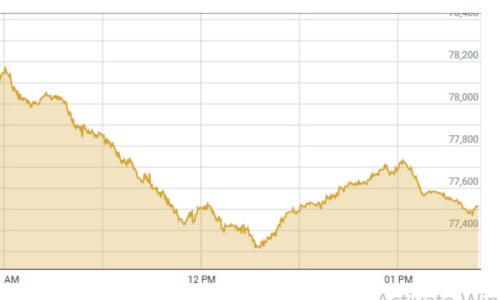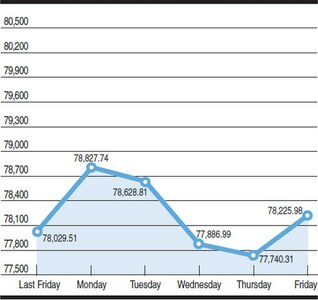The numbers flashing on trading screens on Aug 5 were shocking even to market veterans.
In Tokyo, the Nikkei 225 was down 12 per cent. In Seoul, the Kospi index sank 9pc. When the opening bell rang in New York, the Nasdaq plunged 6pc in seconds.
Cryptocurrencies sank; the VIX, a gauge of stock market volatility, skyrocketed; and investors piled into Treasury bonds, the safest asset of them all.
Whether the wild gyrations on Aug 5 mark the final bang of a global sell-off that started to build last week, or signal the beginning of a protracted slump, is impossible to know.
But one thing is clear: the pillars that had underpinned financial-market gains for years — a series of key assumptions that investors across the world were banking on — have been shaken.
They look, in hindsight, a bit naive: the US economy is unstoppable; artificial intelligence (AI) will quickly revolutionise business everywhere; Japan will never hike interest rates – or not enough to really matter.
Rapid-fire, evidence poured in over the past couple weeks that undermined each of them. The July jobs report was feeble in the US. So too were Big Tech’s AI-driven quarterly earnings. The Bank of Japan (BOJ) hiked rates for the second time in 2024.
The one-two-three punch jolted investors into suddenly seeing the peril inherent in, say, bidding Nvidia shares up 1,100pc in less than two years or loading up on junk-rated loans bundled into bonds or borrowing money in Japan and ploughing it into assets paying 11pc in Mexico.
In the span of three weeks, some US$6.4 trillion (S$8.5 trillion) has been erased from global stock markets.
“It’s the great unwind,” said Mr Vishnu Varathan, head of economics and strategy at Mizuho Bank in Singapore. In the vernacular of traders, trying to pick the right moment to buy an asset that is tumbling is like trying to catch a falling knife. Today, Mr Varathan said, “there are falling knives everywhere”.
A market panic such as this creates risks big and small. Most prominent among them: the sell-off, if left unchecked long enough, could muck up the gears of the financial system, slow lending and act as the final straw that tips the global economy into the recession that many now fear.
That prompted calls for the Federal Reserve to start cutting interest rates — perhaps, some argued, even before the next scheduled policy meeting in September.
In the bond market, the rush into shorter-dated Treasuries briefly drove yields on two-year notes below those on 10-year bonds for the first time in over two years. Known as a “disinversion”, it is a shift that is typically seen as a sign of an imminent recession.
For Mr Ed Yardeni, an economist who has closely tracked markets for half a century, the sudden collapse in markets brought back memories of Black Monday in 1987 — a one-day plunge that shaved 23pc off the Dow Jones Industrial Average. It was scary but, Mr Yardeni notes, ultimately not a harbinger of economic doom.
Back then, “the implication was that we were in or about to fall into recession and that didn’t happen at all”, Mr Yardeni, who runs Yardeni Research, said on Bloomberg TV.
“It had really more to do with the internals of the market. I think there’s the same thing going on here.”
Markets have been rocked by premature recession fears during the current bull market, too. They flared early in 2023 during a short-lived banking panic, only to fade away almost as quickly when the US economy kept powering ahead.
The stock market also bounced back strongly from the drubbing it took in 2022 to hover at record highs in 2024.
The forces that unleashed the Aug 5 market rout had been steadily building for weeks.
In early July — just as tech stocks were hitting a peak — the Japanese yen began appreciating sharply as investors positioned for the BOJ to join other central banks in pulling back its flood of monetary stimulus.
That drove traders to unwind so-called carry trades, which involve borrowing relatively cheaply in Japan and investing elsewhere, to preserve profits they made. This in turn exerted selling pressure on markets worldwide as borrowed money was returned.
That was followed by a steady drumbeat of earnings reports that fanned worries that the big tech stocks — which had driven much of the recent rally — had run up too far, with companies yet to reap any profit bonanza from the massive investments in AI. Amazon.com and Intel both plunged after disappointing results.
At the same time, the bond market kept flashing increasing worries and data signalled that parts of the economy were starting to cool. By July 31 — when the Fed held rates steady at a more than two-decade high and the BOJ tightened policy – bonds had already rallied. Then on Aug 2 they gained further after the unemployment rate rose, and job growth came in well short of forecasts.
Across Wall Street, economists started predicting that the Fed would need to swoop in with half-point cuts or act between meetings – the kind of step usually reserved for a crisis.
Mr Shoki Omori arrived at Mizuho Securities’ Otemachi offices at 6am on Aug 5 ready for big market swings. But even he was surprised at the scale of the sell-off.
As the yen skyrocketed 3pc a result of the BOJ’s rate hikes, the Nikkei index tumbled throughout the session. At day’s end, it had fallen the most since 1987.
“This blew all my expectations,” said Mr Omori, the chief desk strategist in Tokyo. “We’re heading into some unimaginable trading territory here. Brace (yourself) for more.”
The losses went on to ripple through other Asian markets and into Europe, where major stock indexes slumped, and then into the Americas. It seeped into credit markets too, with at least two companies – wireless infrastructure provider SBA Communications and theme park operator SeaWorld Parks & Entertainment – postponing loan deals worth a combined US$3.8 billion.
By late afternoon in the US, stocks recovered from their low, leaving the Nasdaq Composite Index down 3.4pc, and the bond market had steadied. But that did little to calm rattled traders, who were hesitant to chalk this up as just another false alarm.
“I’m still concerned,” said Mr Maley, the strategist at Miller Tabak. “We’re still worried about earnings and the economy.”
This story was originally published on StraitsTimes, an ANN partner of Dawn.















































Dear visitor, the comments section is undergoing an overhaul and will return soon.